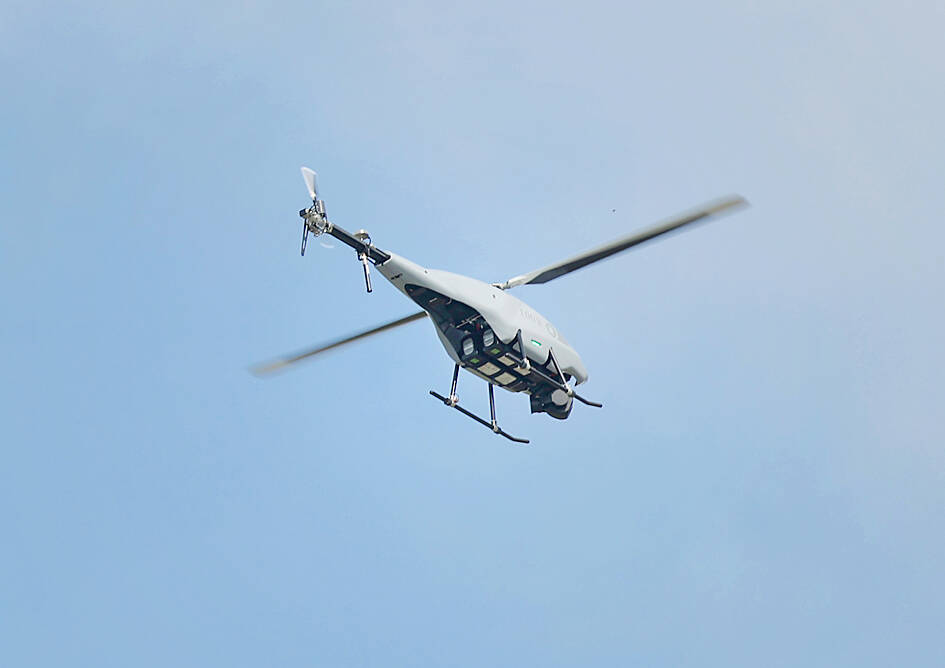A cross-agency task force created to select a team of uncrewed aerial vehicle (UAV) manufacturers yesterday said a national UAV fleet could be established administratively in the latter half of the year after it picks the lead manufacturer for the program this month.
About 3,000 UAVs are to be used for military purposes despite not being made to military specifications, and are expected to be delivered to the military by next year, the task force said.
The UAVs would primarily provide support or be used in field operations, it said.

Photo: CNA
Taiwan has been focused on developing its aerospace industry, under the broader “five plus two” innovative industries and “six core strategic industries” policies.
“Five plus two” refers to plans to develop an “Asian Silicon Valley,” biotechnology, green energy, smart machinery and defense, as well as innovative agriculture and the circular economy.
The six core strategic industries are information technology, cybersecurity, precision health, renewable energy, national defense and strategic stockpiling.
The Ministry of Economic Affairs said nine firms have been reviewed, and by July are expected to produce prototypes for shipborne reconnaissance, land-based reconnaissance and general reconnaissance, as well as prototypes of miniature drones and drones with target-acquisition capabilities.
The Ministry of National Defense is set to launch a limited bidding period in August to select prototypes, the task force said.
Active and passive radars and drone-interference systems have been selected, but the manufacturers for those would not be chosen until after the Lunar New Year, the economic affairs ministry said.
The government is considering the possibility of having the Chungshan Institute of Science and Technology (CSIST) transfer its defensive technologies to manufacturers.
Interested parties must provide proof that China-based companies do not fund them and they do not have shares in China-based firms, and pledge not to use products or components manufactured in China or by Chinese firms, the defense ministry said, adding that they would also be required to sign a nondisclosure agreement.
The task force comprises officials from the National Science and Technology Council, the CSIST, and the defense and economic affairs ministries.

The CIA has a message for Chinese government officials worried about their place in Chinese President Xi Jinping’s (習近平) government: Come work with us. The agency released two Mandarin-language videos on social media on Thursday inviting disgruntled officials to contact the CIA. The recruitment videos posted on YouTube and X racked up more than 5 million views combined in their first day. The outreach comes as CIA Director John Ratcliffe has vowed to boost the agency’s use of intelligence from human sources and its focus on China, which has recently targeted US officials with its own espionage operations. The videos are “aimed at

STEADFAST FRIEND: The bills encourage increased Taiwan-US engagement and address China’s distortion of UN Resolution 2758 to isolate Taiwan internationally The Presidential Office yesterday thanked the US House of Representatives for unanimously passing two Taiwan-related bills highlighting its solid support for Taiwan’s democracy and global participation, and for deepening bilateral relations. One of the bills, the Taiwan Assurance Implementation Act, requires the US Department of State to periodically review its guidelines for engagement with Taiwan, and report to the US Congress on the guidelines and plans to lift self-imposed limitations on US-Taiwan engagement. The other bill is the Taiwan International Solidarity Act, which clarifies that UN Resolution 2758 does not address the issue of the representation of Taiwan or its people in

US Indo-Pacific Commander Admiral Samuel Paparo on Friday expressed concern over the rate at which China is diversifying its military exercises, the Financial Times (FT) reported on Saturday. “The rates of change on the depth and breadth of their exercises is the one non-linear effect that I’ve seen in the last year that wakes me up at night or keeps me up at night,” Paparo was quoted by FT as saying while attending the annual Sedona Forum at the McCain Institute in Arizona. Paparo also expressed concern over the speed with which China was expanding its military. While the US

SHIFT: Taiwan’s better-than-expected first-quarter GDP and signs of weakness in the US have driven global capital back to emerging markets, the central bank head said The central bank yesterday blamed market speculation for the steep rise in the local currency, and urged exporters and financial institutions to stay calm and stop panic sell-offs to avoid hurting their own profitability. The nation’s top monetary policymaker said that it would step in, if necessary, to maintain order and stability in the foreign exchange market. The remarks came as the NT dollar yesterday closed up NT$0.919 to NT$30.145 against the US dollar in Taipei trading, after rising as high as NT$29.59 in intraday trading. The local currency has surged 5.85 percent against the greenback over the past two sessions, central